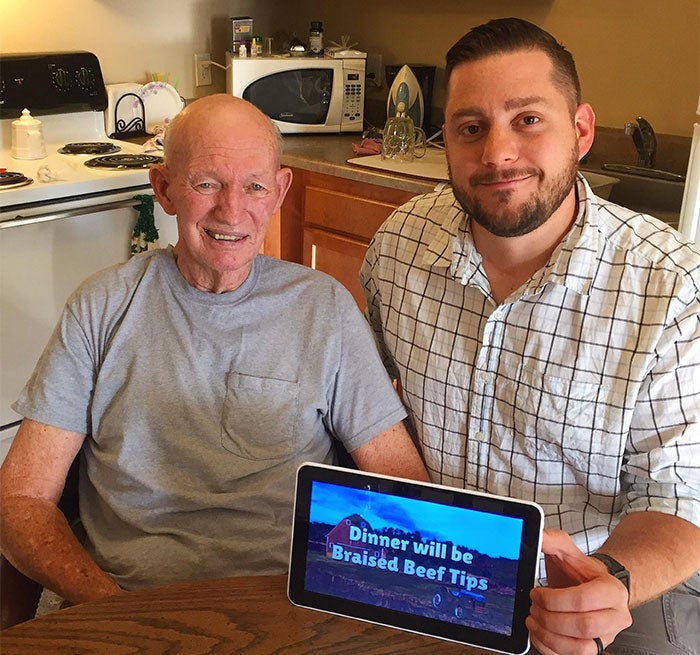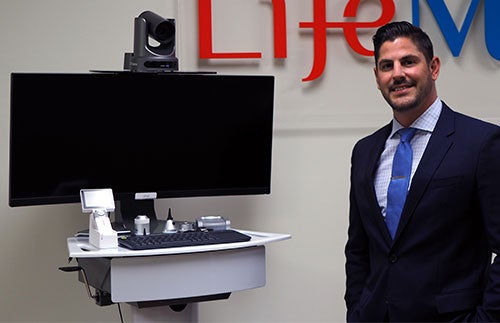Tech talk: IOT, virtual visits and smart hospitals

Walter Remiger poses with his grandson-in-law, Daniel Strabley, to show The WallyBoard, a software that helps patients keep track of their schedules and care.
Software helps seniors take control of care
As proactive patients at ease with technology continue using tools to improve their own care, one company wants to make sure that the traditionally least tech-fluent among us isn’t left out of the “cloud.”
Daniel Strabley, a software developer, has used his expertise to create a system that helps to improve autonomy for patients suffering from cognitive issues. Strabley created the software for his grandfather-in-law, Walter Remiger, who recently moved from his farm to an assisted living facility. A simple clock Strabley built integrates photos from Remiger’s farm to communicate time of day and uses Amazon’s customizable Internet of Things buttons to send key alerts, such as medication reminders, doctor’s appointments, lunch and dinner schedules and even when games of his favorite sports teams will air.
The system, named The WallyBoard after Remiger, can be scaled up to be more interactive or scaled down for simplicity depending on the user. The WallyBoard has received promising response among Remiger and his friends, prompting Strabley and his wife Jessica to develop a facilitywide solution. Strabley says a couple of health care facilities have expressed interest in deploying the system for their patients.
“We are re-engineering our back-end portal system,” Strabley says. “Facilities will have a master account that will show every Wally in the building. From this account, they will be able to set facilitywide notifications for meals, activities, etc. It will also provide them direct access to an individual’s board. The portal system will also serve as a monitor for alarms and alerts. The work for this is currently underway and we’re hoping to have it deployed for spring of 2017.”
Students can visit doc without leaving school
Los Angeles Unified School District (LAUSD) is partnering with LifeMD to deliver telehealth services to five of its schools. Rather than replacing school nurses, the nurses will be able to have real-time video consultations with California-licensed pediatricians for students.

LifeMD CEO Mark Vollaro stands next to telehealth system that will be implemented at five public schools to help nurses treat students.
The program provides an alternative to parents' having to unexpectedly pick up their kids from school to take them to the doctor for conditions that can be managed while in school. Parents can join the telehealth visit remotely without leaving home or work.
The pediatricians can diagnose and issue treatments for common conditions such as colds and ear infections, as well as more complex medical conditions such as asthma. The school district hopes the program will help to reduce absenteeism and close gaps in health care and educational achievement.
“It’s truly an honor to work together with a prominent, forward-thinking district such as the LAUSD,” says Mark Vollaro, CEO of LifeMD. “LifeMD will provide access to our telehealth platform, mobile stations and pediatric physician network to enhance the quality of care and accessibility that our children deserve.”
Hospital sets tech integration goals
The developer of Clio Health Lancaster, Pa., wants the medical center to be one of the most high-tech around. According to Central Penn Business Journal, Aspire Universal has selected a location to build a 140,000-square-foot, four-story medical facility “intended to improve patient experience, produce better health outcomes and lower costs.”
Aspire is an investment firm that has three health care-focused technology companies in its portfolio. Tempo Health LLC, which is developing a mobile software to help those with diabetes predict glucose levels; Medstatix allows doctors to monitor patient satisfaction; and Vitavista is developing X-ray technology to generate faster diagnoses.
Clio Health wants to integrate these technologies and more into an infrastructure that allows them to “talk” to one another and perhaps develop an app that allows patients to access everything related to their care through one platform.




